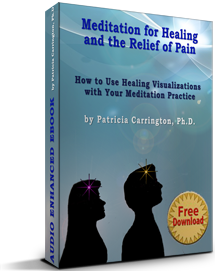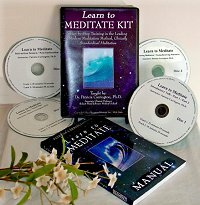Dr. Patricia Carrington's award winning meditation technique CSM (Clinically Standardized Meditation) is a clinically sensitive meditation method developed by the Medical Department of New York Telephone Company and used by numerous medical institutions, organizations, and individuals worldwide. For information click here.
Meditating Under Special Circumstances
Reducing Exam Anxiety
Patricia Carrington, Ph.D.
Author of “The Book of Meditation”
An interesting use of preparatory meditation is for students who are preparing to take an examination. It is a very effective way to lessen exam anxiety, providing the meditator is familiar enough with his own reactions to be able to gauge how soon before the examination it is best for him to meditate.
Getting to the examination room early and sitting quietly in the corner meditating may
|
MEDITATION AUDIO LESSON
Join Dr. Patricia Carrington as she demonstrates two brief exercises you can do to prepare to meditate. Many people find these preparatory exercises deepen the meditation experience and make it more meaningful.
|
be an excellent way to enter an exam for certain students. These students will emerge from their meditation relaxed and with an improved perspective on the forthcoming test. For a person who tends to feel drowsy following meditation, however, meditating directly before an exam would be a poor idea since motivation to achieve could be lowered in this manner and so could alertness. She might also emerge from meditation lacking the degree of aggressiveness needed to tackle the examination successfully. For such people meditating about an hour before an exam, instead of in the examination room, would work much better.
I once conducted an experiment with students at Princeton who were facing their final examination. Many of them had indicated some anxiety about this exam since it constituted a large portion of their final grade. I decided to try to counteract their exam anxiety by leading the class in a mini-meditation (three minutes in length) just before I handed out the test booklets. I showed them a simple Zazen breathing method which I knew would be relatively easy for them to master even if they were not experienced meditators, and purposely kept the meditation time brief in order not to induce sleepiness or over relaxation in the students.
Although the class was initially a bit startled at the announcement of the meditation (for which they had not been prepared) they entered readily into the spirit of it. In an anonymous questionnaire filled out after the exam, over 80 percent of the students reported that the meditation had been helpful in relaxing them during the examination, and the majority of these students said they would like to institute group meditations before other exams at the university. About 20 percent reported having felt annoyed at having to stop to meditate when they had been ‘all psyched up’ for the exam, but none reported that it had harmed their subsequent performance.


